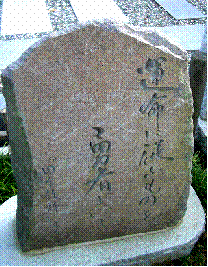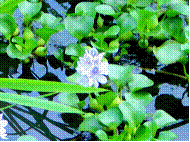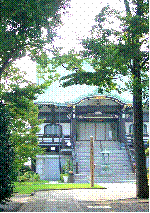|
6 Inaka-Kyoshi (Country Teacher) |
|
|
Inaka-Kyoshi (田舎教師) is a novel written by Tayama Katai(田山花袋)(1872-1930). He had his best friend, Ota Gyokumei(太田玉茗), a Kempukuji-temple(建福寺) priest, in Hanyu(羽生) city. There was a young school teacher boarding in his temple. This teacher died young. When Katai knew about this young teacher’s quiet death in a fuss of victory of the Russo-Japanese War(日露戦争), he couldn’t help feeling pity. Katai wanted to write about this young teacher. Then Gyokumei found a diary kept by this young teacher and showed it to Katai. Katai was so inspired by this diary that he wrote a novel based on this young teacher’s life as a country teacher. |
|
In this novel Hanyu is described as the countryside. The teacher, Hayashi Seizo, (林清三) was young, ambitious and he had a dream. Many of his friends went to the city and continued studying. He also wanted to continue with his literature studies. But he was too poor to make his dream come true. He also had to take care of his parents. He chose a temporary job as a country teacher and made his living. He had to give up his dream and love too! Only when he was teaching children, he could be alive and he could forget his deep despair. Katai described this young teacher’s sufferings and abandonment. He also described the beautiful nature in Hanyu city in contrast. |
|
| Actually, Hanyu city is not the same countryside now. We won’t think that it’s the country side when we visit there. But still it remains as a beautiful place with a lot of nature, especially along the river bank. That’s the river bank that the young teacher walked along and found a lot of plants and wrote down their names in his diary. |

|

|
People in Hanyu-city treasure its beautiful nature and this novel. In fact you can find a lot of beautiful nature and a lot of stone monuments associated with this novel Inaka-Kyoshi.(326語) |
|
novel小説 priest 僧侶・住職 temporally一時的な board下宿する fuss 大騒ぎ victory勝利 couldn’t help ~ing〜しないわけにはいかなかった pity哀れ be inspired感銘を受ける ambitious野心のある continue続ける literature文学 job仕事 make one’s living生計を立てる despair絶望 suffering苦悩 abandonment自暴自棄 describe描写する plants草 treasure大切にする stone monuments 石碑 associate with〜 〜に関連した |
![]()
|
文学好きなALTのジョー(Joe)さんを、羽生出身の舞(Mai)先生が文学散歩へと連れ出します。 |
||
| Mai: | Joe, you are interested in literature, aren’t you? |
 |
| Joe: | Yes, I am. I love novels. I like Japanese novels too. | |
| Mai: | Then have you ever read the novel “Inaka Kyoshi”? | |
| Joe: | Is it “Country Teacher”? Yes, of course. I love it. | |
| Mai: | Then, shall we visit some places written in the novel? | |
| Joe: | That’s a good idea. | |
| Mai: | We can have a good cycling tour. So let’s meet at Hanyu Station | |
| at ten tomorrow. Don’t forget to come by bike. | ||
| Joe: | OK. See you tomorrow. | |
| ***
The next day *** |
||
| Mai: | Hi, Joe. Let’s start the tour. Kempukuji-temple is near here. | |
| Joe: | Is it the temple that the young teacher was boarding at? | |
| Mai: | That’s right. We can find some monuments and the young teacher’s grave. | |
| (They ride to the Kempukuji-temple.) Here we are! | ||
| Joe: | Oh, this is a nice and quiet place. Is this Seizo’s grave? | |
| Mai: | Yes and No. This is Kobayashi Shuzo’s(小林秀三) grave. | |
| He is the model of Seizo. OK, let’s go to the next place. | ||
| We’re going to the river bank. There is a cycling course too. | ||
| Joe: | (Riding on the bike) I love this scenery. Wonderful rice fields! | |
| Look! What are those beautiful mountains? | ||
| Mai: | Those are |
|
| ・・・ This is the Tone River(利根川), the biggest river in Japan. | ||
| Joe: | What’s that? | |
| Mai: | That’s one of the stone monuments of the Country Teacher. | |
| Shall we take a rest and enjoy the scenery? | ||
| Joe: | Yes, let’s. What beautiful nature! I love this place. | |
|
|
||
| (They rest there for a while.) Mai, shall we move on? | ||
| Mai: | OK. Let’s go to see the statue of the Country Teacher. | |
| (They ride to the statue.) Here we are. | ||
| Joe: | Well,.... Is this the teacher? He looks very young! | |
| Mai: | Yes. He died when he was 21 years old. He died of tuberculosis. | |
| We can find Otane-san’s(お種さん) grave and the site of the school he worked near here. | ||
| Joe: | Thanks for showing me a lot of things. I really enjoyed today’s tour. | |
| Mai: | It’s my pleasure. I love my city, Hanyu. | |
|
grave 墓 cycling course サイクリングコース scenery 風景 die of 〜〜で死ぬ tuberculosis 結核 site 跡地 |